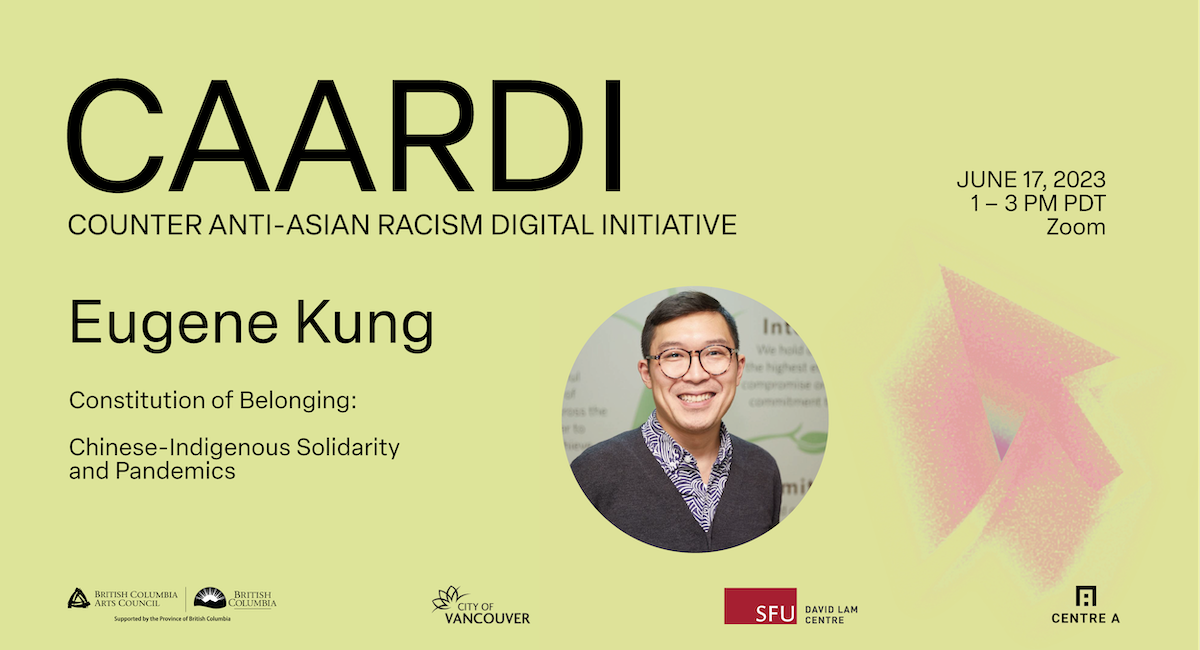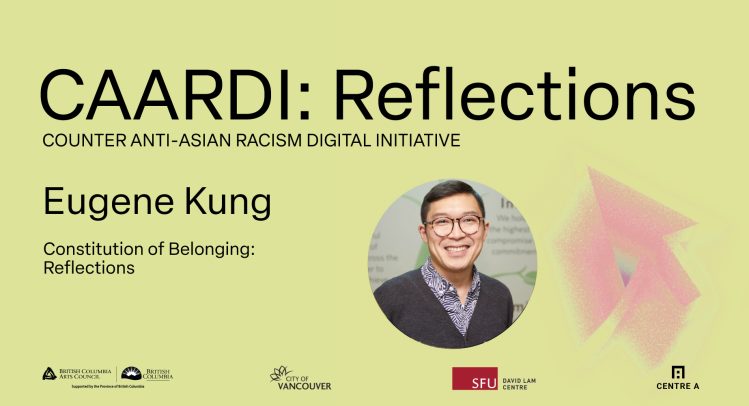Vancouver International Centre for Contemporary Asian Art
 Eugene Kung: Constitution of Belonging: Chinese-Indigenous Solidarity and Pandemics
Eugene Kung: Constitution of Belonging: Chinese-Indigenous Solidarity and Pandemics
Saturday, June 17, 2023, 1 – 3 PM PDT
Centre A (Zoom)
–
Register HERE.
–
Join Eugene Kung for a discussion reflecting on belonging, identity, and place. A personal journey with stories from growing up in Burnaby in the 1990s, to learning about his family’s head tax history, to practicing human rights law in Canada and South Africa.
Through storytelling and reflection, Eugene will explore themes of identity, place, and alienation. He will discuss the legal system and how it institutionalizes worldviews and ask how (or whether) law can be used to achieve climate justice and racial justice. Stories will include lessons learned from working with Indigenous communities, of Chinese-Indigenous solidarity, and the impact of COVID-19.
There will be jokes because they are one of Eugene’s survival mechanisms.

Constitution of Belonging: Reflections
This CAARDI presentation was the most personal and vulnerable public talk I’ve ever done. I usually don’t get too nervous about public speaking, but in the days and nights leading up to the talk, I had butterflies in my stomach and restless energy. It was, in part, because of the personal nature of some of the stories I shared, but also because the audience — the Asian and migrant communities I am trying to reconnect with — felt simultaneously distant and parallel, due to our ancestor’s similar migration journeys, and our own paths navigating these multi-layered identities.
The title: Constitution of belonging, was inspired by one of my heroes, John Borrows, the Ashinaabeg legal scholar and one of the intellectual elders of the Indigenous law revitalization movement. Dr. Borrows reminds us that the word “constitution” comes from the verb “to constitute”, which means: to be part of, to put together, to form or compose.
In that sense, the themes I explored were fundamentally about having to compose an identity that weaves together hundreds of years of migration, driven by colonial and imperial violence, both in the homelands of my ancestors in China, and in the land of my birth in Canada.
Each one of us has to form a sense of ourselves, but not everyone has the foundational security of belonging upon which to build – especially in a country that was built on colonization and the ideology of white supremacy. Constitution of belonging was meant to capture the (ongoing and likely never ending) process of finding myself by learning from my ancestors’ stories of migration 100 years ago as the Chinese Exclusion Act came into effect, but also the stories, teachings and laws of the original peoples of land where I grew up: Tsleil-Waututh, Squamish and Musqueam.
The title also reflects the fundamental paradox of the Canadian state: that its constitutional law is unlawfully constituted [1] — something that is ever-present in my work as a lawyer working with and for Indigenous peoples. That is, if the Supreme Court of Canada were to follow its own conclusions about terra nullius (or the Vatican’s repudiation of doctrine of discovery), then they would reason themselves, and the state, out of existence.
Since that’s not happening anytime soon, we are left to constitute our own sense of belonging by piecing together what we can from what we can gather.
Connecting with my ancestors’ stories while learning from Indigenous laws and teaching of the lands where I live has allowed for me to constitute my own sense of belonging and confront the anti-Asian racism that I had internalized growing up. It is an ongoing journey of learning and unlearning.
I want to thank my friend Rueben George for opening the talk in a good way, and for always being generous with his teachings and spirit.
Chinese Association vs Minister of Labour (decision)
TWN Assessment of Trans Mountain
References
[1] Simpson, M., 2008. Other worlds are actual: Tully on the imperial roles of modern constitutional democracy. Osgoode Hall Law J. 46, 509., Tully, J., 2008. Modern constitutional democracy and imperialism. Osgoode Hall Law J.
46, 461.
–
Eugene Kung (BA, JD) has been practicing law in BC for 15 years, working at the intersection of climate justice, energy economics and human rights. Currently, Eugene works with Indigenous communities to revitalize and apply their own laws to contemporary issues such as opposing the Trans Mountain Pipeline Expansion.
Eugene is a regular media commentator, has published numerous articles and reports, and is a frequent guest speaker at high schools and universities. Born and raised in Burnaby, BC, he studied Political Science at UBC and Law at Dalhousie. Eugene has also lived in Australia, New Zealand, Fiji, and South Africa where he deepened his analysis on colonization and racial justice. Eugene enjoys exploring food culture, following many kitchen jobs. He is also a mediocre musician (but above average at karaoke).
Accessibility: The gallery is wheelchair and walker accessible. If you have specific accessibility needs, please contact us at (604) 683-8326 or [email protected]. As the workshop will take place in the format of a Zoom Meeting, audio transcripts will be available upon request.
Centre A is situated on the unceded territories of the Musqueam, Squamish, and Tsleil-Waututh peoples. We honour, respect, and give thanks to our hosts.






